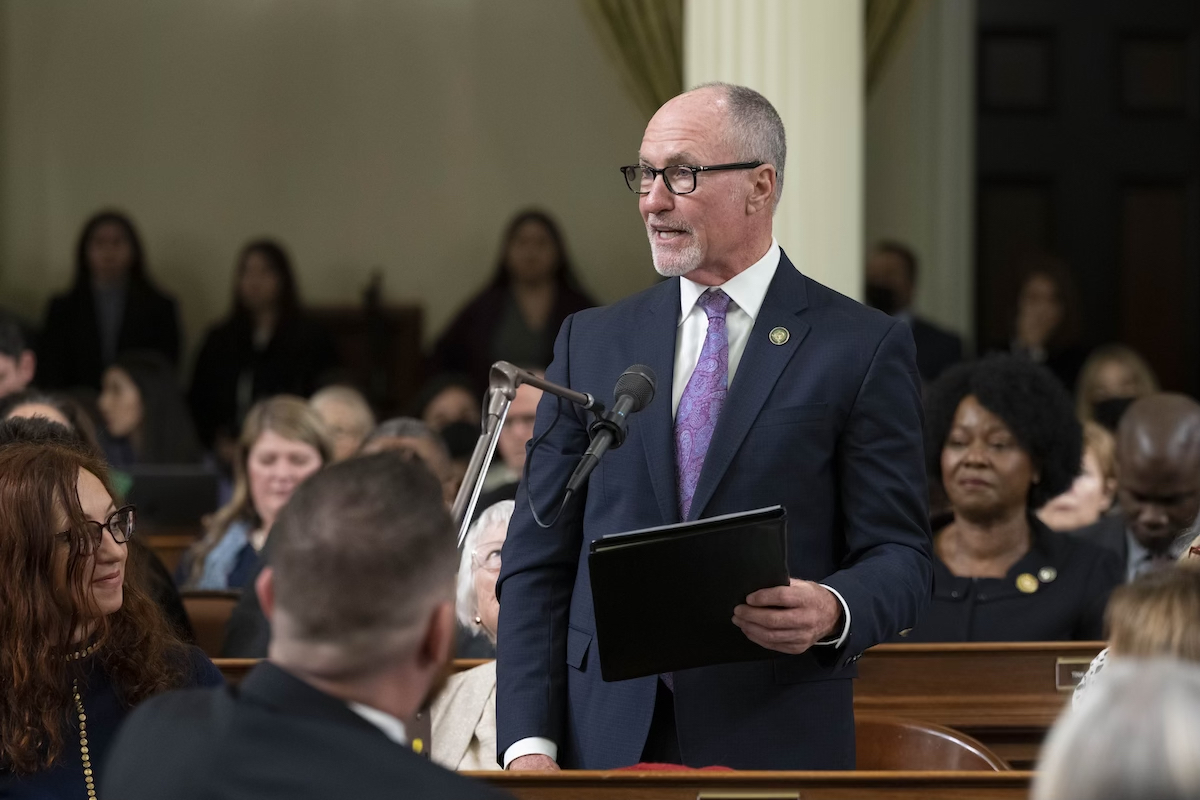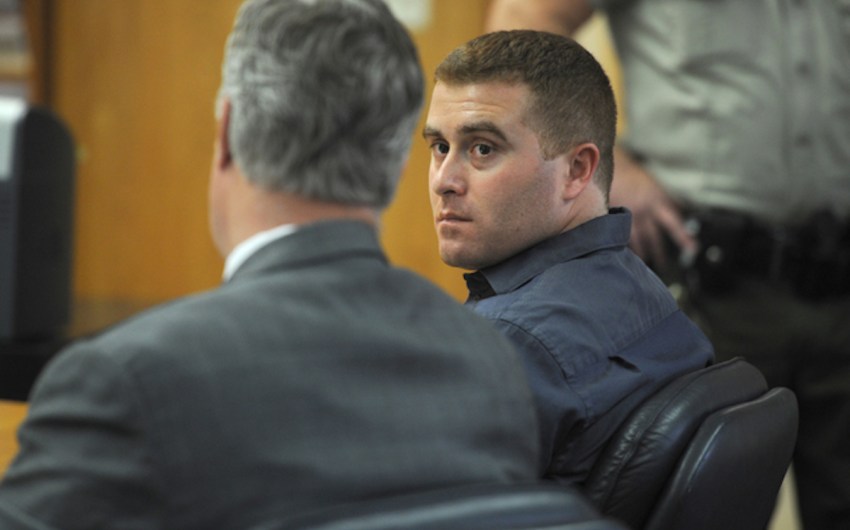Gregg Hart on Trump Fears and Sable Pipeline Shocker
'Washington Is Not Going to Control Decisions We Make in California,' Says Santa Barbara's State Assemblymember

This story first appeared at Newsmakers with JR.
“States’ Rights” is a political philosophy that is commonly linked in U.S. history to the Secessionist Crisis of 1860 that triggered the nation’s Civil War.
Paradoxically, “states’ rights” now have become a crucial doctrine for California and other progressive states to wield as a bulwark against Donald Trump move to impose his right-wing authoritarian project on the federal government.
“Washington is not going to control the decisions that we make in California,” said Assemblymember Gregg Hart, who represents Santa Barbara in the state legislature.
“We have our own autonomy — the states have rights, local governments have rights, and we’re going to contest these issues in federal court,” Hart added. “And climate is one of the big ones.”
In the third installment of Newsmakers‘ “Standing Up to Trump” series, the Santa Barbara Democrat offered in depth and detail his assessment of the political threats the president-elect has expressed toward a range of California’s pioneering polices on climate change, energy, and the environment — and his expectations of how the state will fight back.
At a time when Trump’s MAGA movement has subjugated the national Republican Party, which next month will control the White House, the Senate, and the House of Representatives — not to mention the U.S. Supreme Court — Hart said that federalism provides legal and political avenues for California to maintain its position as a global leader in climate protection.
“The first thing we need to do is to recognize the words that the president has used and the real threat that poses to our interest and be prepared,” Hart said.
“There’s no way to know exactly what’s actually going to happen when President-elect Trump is sworn in for his second term,” he added. “But we do know what happened the first time around, and there were actions the federal government took that would hurt California and our residents and we pushed back against those to protect our neighbors and our interests, and we were pretty successful in the first term. I think we filed about 120 federal lawsuits and were successful in about 80 percent of them.”
Pipeline shocker. Hart made big news during the interview, disclosing that Gov. Gavin Newsom’s office and the state Fire Marshal have decided to grant a waiver that represents a major procedural victory in the efforts by Sable Offshore Corp. to restart operation of its controversial pipeline near Refugio State Beach. The same pipeline ruptured in 2015, despoiling the shore and ocean with tens of thousands of gallons of crude oil.
Because Santa Barbara County lawyers previously reached a secret settlement of litigation with Sable, this means that the Coastal Commission and the State Lands Commission now represent the only possible venues where local citizens may have a chance to protest the pipeline restart.
“Unfortunately, one thing I learned [December 17] from the Fire Marshal is that they have made the decision to go ahead and ask the federal government for a waiver for the pipeline,” he said. “And that was shocking news … so that was difficult news to hear.”
In an interview focused largely on environment and energy issues, Hart also:
- Applauded President Biden’s Environmental Protection Agency’s approval this week of California’s climate policy that is aimed at eliminating the sale of gas-powered cars in the state by 2035 — but acknowledged that Trump is likely to try to overturn the decision. “There will be turbulent decisions … ahead,” he said.
- Expressed concern about the new Administration disrupting the state’s progress on developing wind energy, given Trump’s idiosyncratic opposition to the alternative energy source. “Having a four-year period when we don’t have a federal partner … [would] be very damaging,” Hart said.
- Framed recent landmark legislation, to regulate inventories at gasoline refineries in the state —sponsored by Newsom and authored by Hart — not only as necessary to ease the volatility of California gas pump prices, but also as a key step “in having a much closer relationship with the oil industry to make sure that this transition works.”
- Offered assurances that he and other members of the Legislature’s “Central Coast Caucus” will protect the coast from over-building, as Sacramento keeps eroding local control over planning and development in the name of addressing the state “housing crisis.” “We need to be sensitive to the different communities’ interests,” he said.
- Acknowledged the state Insurance Commissioner “has moved very slowly” to respond to widespread cancellations of homeowners insurance policies, following an epidemic of destructive wildfires, but added that recent state regulatory concessions that allow insurance companies to adjust their “catastrophic risk modeling” should increase the availability — along with the price — of insurance.
“The bottom line is, ideally, more companies stay in California, and potentially even come back to California, to write policies that will create some price competition,” Hart said. “But it is almost a certainty that insurance is going to be more expensive as we go forward, because the risk is more significant and the cost to repair homes is increasing at a rate higher than inflation.
“So it is a really difficult, challenging problem that is directly related to climate change,” he added.
Check out the entire interview with Assemblymember Gregg Hart via YouTube below.
Premier Events
Sat, Dec 21
11:00 AM
Santa Barbara
Mosaic Makers Market – Holiday Weekend Market
Sun, Dec 22
11:00 AM
Santa Barbara
Mosaic Makers Market – Holiday Market Finale
Wed, Dec 25
6:00 PM
Santa Barbara
FREE Contra Dance X-mas Day💃Corwin & Grace band6-9
Fri, Dec 20
5:00 PM
Santa Barbara
1 Year Anniversary + Holiday Party for Loud Flower Art Co and Restricted Goods
Fri, Dec 20
5:00 PM
Santa Barbara
Espresso Martini Bar
Fri, Dec 20
5:30 PM
Santa Barbara
First United Methodist Church Living Nativity
Fri, Dec 20
8:00 PM
Santa Barbara
Winter Wonderland Party
Fri, Dec 20
9:00 PM
Santa Barbara
Film Screening: “Love Actually”
Sat, Dec 21
11:00 AM
Santa Barbara
Mosaic Makers Market – Holiday Weekend Market
Sat, Dec 21
12:00 PM
Santa Barbara
Gift Wrapping with Life Chronicles
Sat, Dec 21
2:00 PM
Santa Barbara
State Street Ballet’s 30th Anniversary Production of ‘The Nutcracker’
Sat, Dec 21
4:00 PM
Santa Barbara
Wine + Painting Workshop
Sat, Dec 21
5:00 PM
Santa Barbara
The Rhythm Industrial Complex: Live at Fox Wine Co
Sat, Dec 21 11:00 AM
Santa Barbara
Mosaic Makers Market – Holiday Weekend Market
Sun, Dec 22 11:00 AM
Santa Barbara
Mosaic Makers Market – Holiday Market Finale
Wed, Dec 25 6:00 PM
Santa Barbara
FREE Contra Dance X-mas Day💃Corwin & Grace band6-9
Fri, Dec 20 5:00 PM
Santa Barbara
1 Year Anniversary + Holiday Party for Loud Flower Art Co and Restricted Goods
Fri, Dec 20 5:00 PM
Santa Barbara
Espresso Martini Bar
Fri, Dec 20 5:30 PM
Santa Barbara
First United Methodist Church Living Nativity
Fri, Dec 20 8:00 PM
Santa Barbara
Winter Wonderland Party
Fri, Dec 20 9:00 PM
Santa Barbara
Film Screening: “Love Actually”
Sat, Dec 21 11:00 AM
Santa Barbara
Mosaic Makers Market – Holiday Weekend Market
Sat, Dec 21 12:00 PM
Santa Barbara
Gift Wrapping with Life Chronicles
Sat, Dec 21 2:00 PM
Santa Barbara
State Street Ballet’s 30th Anniversary Production of ‘The Nutcracker’
Sat, Dec 21 4:00 PM
Santa Barbara
Wine + Painting Workshop
Sat, Dec 21 5:00 PM
Santa Barbara

























